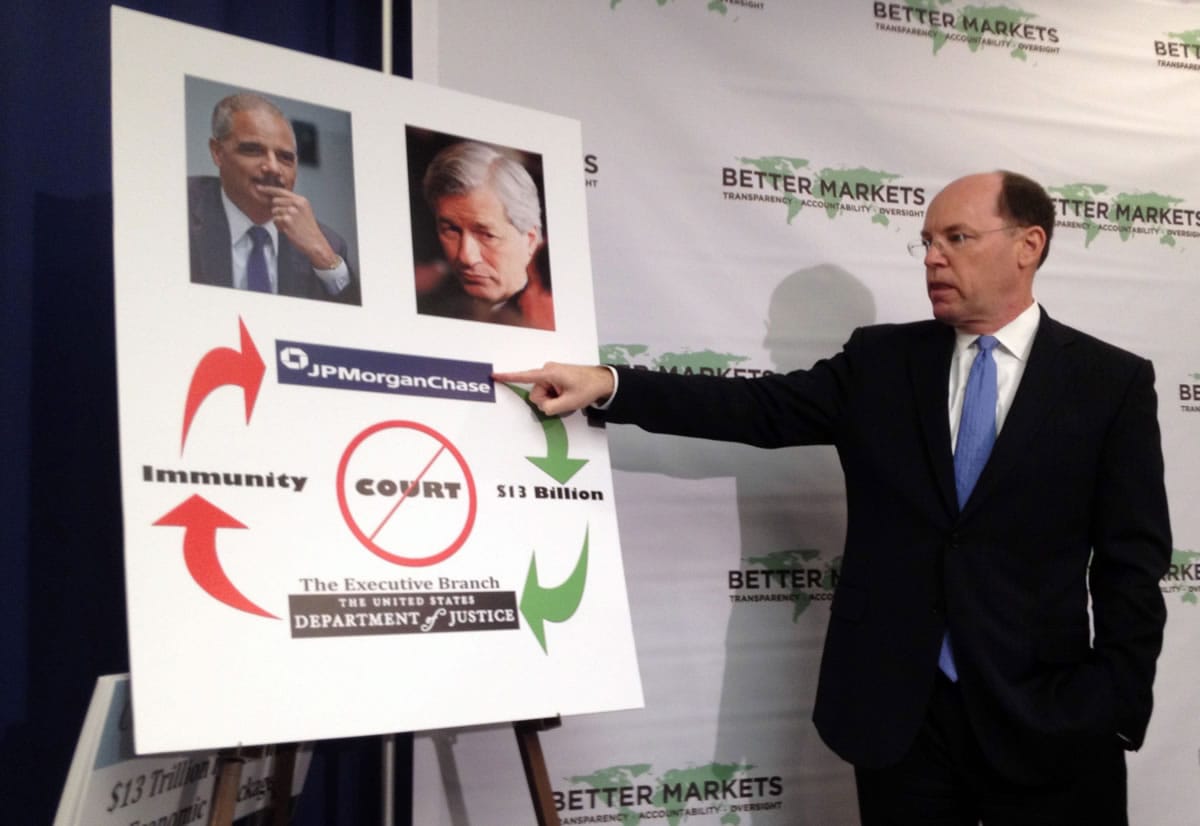WASHINGTON — A public advocacy group filed a legal challenge Monday to block implementation of a record $13 billion civil settlement between Attorney General Eric Holder and Wall Street powerhouse JPMorgan Chase & Co.
The group, Better Markets, argued that reaching a settlement 300 times the nearest similar settlement without any sort of judicial review amounted to a power grab by the executive branch and Holder.
“It reads the separation of powers right out of the Constitution,” Better Markets President Dennis Kelleher said at a news conference. Kelleher is a former top Democratic lawyer in the Senate and a onetime securities litigator at the law firm Skadden, Arps, Slate, Meagher & Flom.
Holder negotiated privately with JPMorgan Chase CEO Jamie Dimon to reach the November deal, in which Wall Street’s top bank did not admit guilt and simply agreed to a statement of facts. The privately brokered deal, said Kelleher, put on ice plans by federal prosecutors in Sacramento, Calif., to seek an injunction against JP-Morgan Chase.
“This case really stands out, let’s face it, for the power grab,” Kelleher said.
The settlement did not preclude criminal charges brought against JPMorgan Chase employees or those in companies it acquired. But since the 2008 financial crisis, there have been few prosecutions of high-level Wall Street executives.
Specifically, Monday’s legal filing asks the U.S. District Court for the District of Columbia to impose an injunction halting the settlement with JPMorgan Chase from going forward. It calls the settlement unconstitutional and also alleges it violates the Administrative Procedures Act and, more importantly, the Financial Institutions Reform, Recovery and Enforcement Act of 1989.
That latter, known as FIRREA, is the tool the Justice Department frequently uses to settle lawsuits with Wall Street. If a court were to rule against the attorney general, it could discourage future use of FIRREA to reach settlements.
Neither the Justice Department, nor JPMorgan Chase chose to address the Better Markets action.
“We’ll decline comment,” said Joseph Evangelisti, a JPMorgan Chase spokesman. Justice Department officials did not return calls for comment.
One prominent legal expert called the Better Markets effort a long shot.
“While Better Markets is a well-intentioned and aggressive advocate for investors, I do not believe there is any basis or support in law for their position,” said John Coffee, a securities law professor at Columbia University in New York and a frequent witness before Congress. “The executive branch can settle disputes with a third party without seeking court approval.”
Had the Justice Department filed a lawsuit, it still could settle without court approval providing it is not a class-action suit and there is no injunction involved, he said.
“The courts don’t have a role inherently in settling all disputes,” said Coffee, suggesting a court ruling favoring Better Markets would set precedent. “I think this would greatly expand the role of the judiciary in resolving disputes.”
Significantly, no outside law firms signed on to the Better Markets action, nor do any appear as a counsel of record. That’s often a sign that a case lacks strong backing of the underlying legal argument.
It’s not clear Better Markets has legal standing to bring such a request for injunction since it was not a homeowner, investor or shareholder harmed by JPMorgan Chase’s behavior in the run-up to the financial crisis of 2008. Kelleher said as a public advocacy group, Better Markets’ request for relief is very much like the actions of groups that have successfully won court injunctions when citizen health or the environment are being harmed.
Kelleher hopes to call attention to the unusual nature of such a large, mostly private settlement. There were no executives punished, no behaviors specified that needed halting or correcting. And there was a blur between the untoward activities carried out by JPMorgan Chase personnel versus those carried out by employees at the failed investment bank Bear Stearns and the failed thrift Washington Mutual.
JPMorgan Chase purchased each of them respectively in March and September 2008 for pennies on the dollar, with encouragement from the Federal Reserve and the Treasury Department in the interest of financial stability. The Justice Department settlement broadly covered alleged wrongdoing by all three entities over a period from 2005 to 2007.
The entire settlement was designed to “conceal, not reveal,” Kelleher insisted, adding that such a deal carried out by the Bush administration would have drawn cackles from Democrats.
“If (former Attorney General) Alberto Gonzales did this with Halliburton, what would people say?” he asked incredulously, adding, “$13 billion is a lot of money, but not for Wall Street.”



